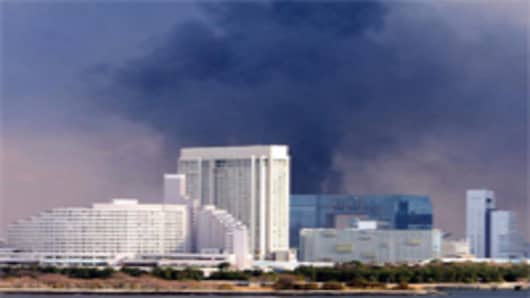The 8.9 magnitude earthquake that hit Japan Friday will likely dent investor confidence in the short term, but is unlikely to derail the global economic recovery, analysts told CNBC.
The fifth-largest earthquake since 1900 triggered a powerful tsunami that caused widespread damage, and alarms have been sounded in Hawaii to warn of an approaching tsunami.
“We have seen massive earthquakes in Japan before. We know this is a very big one but nonetheless infrastructure is very different in Japan,” Hans Redeker, Global Head of Foreign Exchange at BNP Paribas told CNBC.
But the quake would add to Japan’s fiscal problems, he said. “The government was planning to go into fiscal consolidation and that is not going to happen because of this earthquake.” He estimated the cost of rebuilding the country at 2 to 3 percent of Japan’s gross domestic product (GDP).
“The question is whether Japan will reach debt levels which are unsustainable,” Redeker said. The domestic crowd, so far, had been buying government debt to 93 percent … "but this is definitely not good news for that market,” he said.
The Japanese government declared a nuclear power emergency situation, Jiji News said, citing the country’s defense ministry. A secondary quake warning has been issued and several aftershocks have been felt.
“We don’t get that many of that size of earthquake across the world. It happened quite close to the surface and very close to the Japanses coastline … there was very little chance for warning even with the best warning system in the world,” Dr Simon Vauxhall, oceanographer at the University of Southampton, said.
“It’s flooding onto the coast incredibly quickly and picking up all kinds of debris. What looks like small sticks and rubbish are building and cars … dragging huge wall of debris through the countryside,” he said.
“You’ll be able to pick up the actual wave around the entire Pacific rim. The big question is, will it be an inch higher or several meters higher?” he said of the threat to other countries.
Insurers fell following news of the earthquake, with Munich Re, Hanover Re and Swiss Re down around 5 percent in morning trade in Europe.
“It’s clear that it’s going to be another hit to confidence,” Gilles Moec, senior European economist at Deutsche Bank said.
Redeker added the agricultural damage also seemed to be significant and could boost food pricesat a time when commodity prices are already sharply higher.
While the disaster is likely to upset markets in the short term, the rebuilding in the aftermath could prove a boost to the Japanese economy, “There may be a stimulative effect on the economy from the reconstruction, “ Song Seng Wun, regional economist at CIMB said.
“No markets like uncertainty … and that uncertainty may create a bit of worry … and we might see a slight pullback of confidence in the near term,” he said.
But the impact on the global economy would be relatively small.
“This might dent confidence in Japan but if the overall impact is fairly small it may recover fairly quickly and give more activity to the local economy,” he said.


